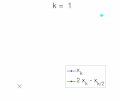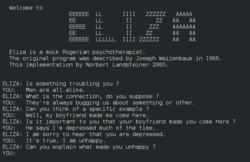In computer science, pseudocode is a description of the steps in an algorithm using a mix of conventions of programming languages (like assignment operator...
15 KB (1,441 words) - 13:15, 18 April 2025
interprets pseudocode in Spanish, the Android version interprets pseudocode in English, Spanish and Portuguese. PSeInt is the abbreviation of PSeudocode Interpreter...
5 KB (443 words) - 12:36, 28 March 2025
host programming language but allow good abstraction in the pseudocode) and a pseudocode program that defines the syntax of the input language by the...
3 KB (430 words) - 01:46, 9 November 2023
program structures and so called dummy code. Program skeletons resemble pseudocode, but allow parsing, compilation and testing of the code. Dummy code is...
19 KB (2,500 words) - 17:31, 21 May 2025
documenting methods and procedures in software. It is related to pseudocode, but unlike pseudocode, it is written in plain language without any terms that could...
1 KB (122 words) - 20:04, 26 March 2024
Fitness proportionate selection (section Pseudocode)
Fitness proportionate selection, also known as roulette wheel selection or spinning wheel selection, is a selection technique used in evolutionary algorithms...
8 KB (1,066 words) - 21:37, 4 June 2025
Microframework (section Pseudocode example)
A microframework is a term used to refer to minimalistic web application frameworks. It is contrasted with full-stack frameworks. It lacks most of the...
2 KB (219 words) - 11:59, 20 November 2024
Open addressing (section Example pseudocode)
while separate chaining typically can use up to 100%. The following pseudocode is an implementation of an open addressing hash table with linear probing...
9 KB (1,225 words) - 10:26, 16 June 2025
Floyd–Steinberg dithering (category Articles with example pseudocode)
transform dithering. The algorithm described above is in the following pseudocode. This works for any approximately linear encoding of pixel values, such...
5 KB (662 words) - 09:17, 10 June 2025
Pseudocode for implementing critical section...
12 KB (1,607 words) - 13:58, 5 June 2025
Berlekamp–Massey algorithm (section Pseudocode)
The Berlekamp–Massey algorithm is an algorithm that will find the shortest linear-feedback shift register (LFSR) for a given binary output sequence. The...
9 KB (1,222 words) - 06:47, 3 May 2025
Backtracking (section Pseudocode)
Backtracking is a class of algorithms for finding solutions to some computational problems, notably constraint satisfaction problems, that incrementally...
15 KB (1,986 words) - 14:56, 21 September 2024
LZ77 and LZ78 (section Pseudocode)
more recent and may correlate better with the next input. The following pseudocode is a reproduction of the LZ77 compression algorithm sliding window. while...
18 KB (2,566 words) - 09:26, 9 January 2025
Cooley–Tukey FFT algorithm (category Articles with example pseudocode)
floating-point operation, around 20% of which are multiplications.) In pseudocode, the below procedure could be written: X0,...,N−1 ← ditfft2(x, N, s):...
36 KB (5,348 words) - 13:38, 23 May 2025
increasing number of calculations needed (see examples below). The following pseudocode in MATLAB style demonstrates Richardson extrapolation to help solve the...
14 KB (2,734 words) - 10:41, 13 June 2025
Kernighan–Lin algorithm (section Pseudocode)
The Kernighan–Lin algorithm is a heuristic algorithm for finding partitions of graphs. The algorithm has important practical application in the layout...
4 KB (641 words) - 04:39, 29 December 2024
Vertex cover (section Pseudocode)
In graph theory, a vertex cover (sometimes node cover) of a graph is a set of vertices that includes at least one endpoint of every edge of the graph....
22 KB (2,556 words) - 01:21, 17 June 2025
using a specific programming language, the algorithms are written in pseudocode. The descriptions focus on the aspects of the algorithm itself, its mathematical...
8 KB (753 words) - 08:06, 13 December 2024
Gerchberg–Saxton algorithm (category Articles with example pseudocode)
signals, the GS algorithm is also valid for one-dimensional signals. The pseudocode below performs the GS algorithm to obtain a phase distribution for the...
5 KB (472 words) - 16:19, 21 May 2025
Viterbi algorithm (section Pseudocode)
The Viterbi algorithm is a dynamic programming algorithm for obtaining the maximum a posteriori probability estimate of the most likely sequence of hidden...
20 KB (2,664 words) - 22:57, 10 April 2025
Effective hand strength algorithm (section Pseudocode)
Effective Hand Strength (EHS) is a poker algorithm conceived by computer scientists Darse Billings, Denis Papp, Jonathan Schaeffer and Duane Szafron that...
5 KB (610 words) - 09:57, 21 July 2024
as possible to pseudocode and analyzed hundreds of computer science and mathematics papers, courses, books and journals using pseudocode to extract the...
9 KB (756 words) - 15:33, 28 April 2025
Shellsort (section Pseudocode)
Shellsort, also known as Shell sort or Shell's method, is an in-place comparison sort. It can be understood as either a generalization of sorting by exchange...
34 KB (3,463 words) - 21:57, 15 May 2025
Computer animation (section 2D sprites and pseudocode)
each displayed frame, to make the sprite appear to move. The following pseudocode makes a sprite move from left to right: var int x := 0, y := screenHeight...
54 KB (5,905 words) - 13:12, 19 June 2025
Breadth-first search (section Pseudocode)
Breadth-first search (BFS) is an algorithm for searching a tree data structure for a node that satisfies a given property. It starts at the tree root and...
14 KB (1,856 words) - 16:26, 25 May 2025
DSatur (section Pseudocode)
DSatur is a graph colouring algorithm put forward by Daniel Brélaz in 1979. Similarly to the greedy colouring algorithm, DSatur colours the vertices of...
6 KB (769 words) - 11:48, 30 January 2025
Barnsley fern (section Pseudocode)
The Barnsley fern is a fractal named after the British mathematician Michael Barnsley who first described it in his book Fractals Everywhere. He made it...
11 KB (1,329 words) - 15:36, 12 March 2025
Algorithm (category Articles with example pseudocode)
be expressed in many kinds of notation, including natural languages, pseudocode, flowcharts, drakon-charts, programming languages or control tables (processed...
61 KB (7,016 words) - 23:55, 19 June 2025
Recursion (computer science) (category Articles with example pseudocode)
demonstrates the computation that would be performed in evaluating the pseudocode above: This factorial function can also be described without using recursion...
62 KB (7,388 words) - 14:45, 29 March 2025
ELIZA (section Pseudocode)
ELIZA is an early natural language processing computer program developed from 1964 to 1967 at MIT by Joseph Weizenbaum.[page needed] Created to explore...
33 KB (3,816 words) - 11:10, 30 May 2025













